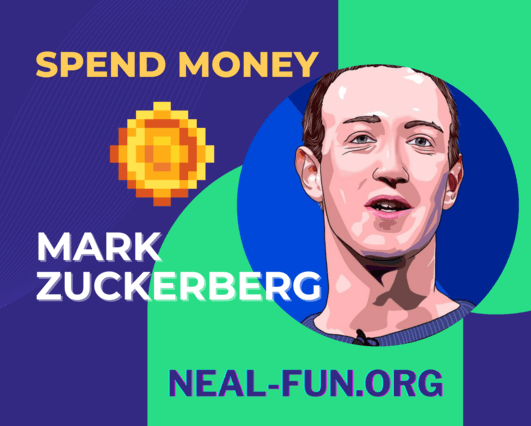Invest in Mark Zuckerberg With startling clarity, NealFun.org unfolds like a high-stakes simulation in which every click rips off millions. You can spend money on private islands or donate to international charities while Zuckerberg’s enormous fortune decreases—or, more accurately, hardly moves at all. A refreshingly clear view of the enormous gap between billionaire wealth and ordinary life is provided by the game’s masterfully designed interface, which is reminiscent of a sleek finance dashboard.
When the slider alternates between indulgence and altruism, the experience becomes especially thought-provoking. Will you purchase 200 opulent yachts or invest in a promising tech startup? Intentionally poignant, the juxtaposition emphasizes how people with unthinkable wealth can influence market trends or save entire communities. With every choice, it’s like managing a “swarm of bees” that buzz between frivolity and purpose.
| Attribute | Details |
|---|---|
| Simulation Title | Spend Mark Zuckerberg Money Nealfun.org |
| Creator | Neal Agarwal |
| Platform | Browser-based, desktop/tablet/phone |
| Net Worth Displayed | Over $100 billion |
| Game Modes | Standard play, 1‑Minute Challenge, Unblocked Version |
| Purchase Types | Luxury items, investments, philanthropy |
| Noteworthy Features | Real-life prices, donation tiers, high-speed buying |
| Educational Value | Teaches purchasing power and wealth inequality |
| Cultural Impact | Sparks discussions on billionaire influence and ethics |
| Related Simulations | Spend Elon Musk’s Money, Life Stats, Deep Sea |
| Reference | www.neal.fun |
The simulation is a very powerful tool for teaching players about wealth inequality because it blends whimsy and data. You realize that even extravagant purchases hardly scratch Zuckerberg’s pile when you see $90 billion in the account after buying ten rockets. Lessons about purchasing power become easier to understand but still have a significant impact.
Stories about billionaires changed from ones of admiration to ones of scrutiny during the digital boom era. This changing sentiment is captured in Neal Agarwal’s game. It’s tinged with curiosity, not anti-success. You’re not envious of Zuckerberg, but you are forced to consider what you would do if the numbers were unimaginable.
These reflections get an adrenaline boost from the one-minute challenge. In a race against time, you frantically navigate menus in an effort to spend down a fortune that is obstinately intact. It demonstrates the sheer size of a billion, which is better represented by purchases rather than balance sheets.
There is no sidelining of philanthropy. Users are reminded that big fortunes come with practical power by the options to establish schools, fund medical research, or provide scholarships. Social awareness is fostered by the combination of ethics and extravagance. You browse luxury but ultimately decide between famine relief and private jets.
Spend Zuckerberg, Mark Additionally, money makes subliminal remarks about media and celebrity culture. Zuckerberg serves more as a forum for conversation than as a character. This simulation uses a single name as a lightning rod to talk about larger trends in money, fame, and public accountability because stories about influencers and moguls are always in the news.
Play is sophisticated despite its simplicity. Simply click and see the feedback; no tutorial is required. However, the psychological effects are multifaceted. Players experience the ridiculousness of inequality when paying $50 million for a ticket seems insignificant.
Not all conclusions are lofty, of course. Some will overspend, giving in to fantasy without hesitation—a harmless rush. Others will take it seriously and choose investments or charitable giving. The design is very inclusive and versatile because it accommodates both impulses.
Technologists value the intersection of societal critique and game mechanics. Neil Agarwal has created a tool that is both amusing and thought-provoking by utilizing real-world price data and converting it into playful interactions. Its power resides in striking a balance between inspiring introspection and preaching.
The simulation has gained enormous traction. Videos of gamers blowing up doughnut shops or forcing fictional economies into bankruptcy go viral on social media. Every TikTok video or stream turns into a personal story about value, wealth, and desire—all encapsulated in an entertaining challenge.
The game is a treasure trove for educators. It can be used by educators to project budgets, model economic situations, or spark discussions about whether billionaires should spend money on prevention or monuments. Students can relate to abstract figures because mouse clicks are relatable.
The idea is also gaining traction. This format—which simulates spending for fictional worlds, historical figures, or national economies—is being expanded upon by other creators. Spend Zuckerberg, Mark A new type of interactive learning that democratizes the understanding of large numbers through simulation may have been sparked by Money.
The game has made difficult concepts understandable through strategic simplicity. Players are encouraged to budget their money; some strive for impact, while others aim for grandeur. Every path opens a mirror to the viewer’s values by reflecting individual priorities.
You’re likely to get more than a high score if you play this simulation now. You’ll have a better understanding of how money can be used to repair communities with clinics and to adorn skylines with megayachts. In spite of its lighthearted appearance, Spend Mark Zuckerberg When money doesn’t matter, it creates a conversational layer about wealth, accountability, and what matters most.
